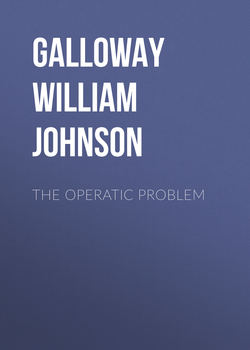The Operatic Problem

Реклама. ООО «ЛитРес», ИНН: 7719571260.
Оглавление
Galloway William Johnson. The Operatic Problem
The Operatic Problem
Italy
Germany
France
The English National Opera House
OPERA FOR THE PEOPLE
Отрывок из книги
Opera has, since its origin, been considered the highest form of theatrical pastime. The very appellation "opera" indicates that in the land of its birth it was looked upon as the "work" par excellence, and to this day it is the form of Art which is invariably honoured by exalted patronage, and one that people pay the most to enjoy. It is hardly necessary to advance documentary evidence in support of this assertion; moreover, it is beyond the scope of this book to marshal all the historical facts. My chief consideration will be to deal with the prospect of National Opera in England, and to take the existing state of things as the basis for future action. But some retrospect showing that the originators of opera understood its importance, and knew admirably how to define its scope, may prove interesting.
The following extract from the preface to Vitali's Aretusa, the score of which is in the Barberini Library, performed in Rome on the 8th of February 1620, is worth quoting in corroboration of the statement: —
.....
Thus Italy, France, Germany, Austria, Spain, Russia, Sweden, Norway, Denmark, Greece have their endowed or subsidised theatres; they can boast of an artistic musical past and operatic tradition, and make a proud show of creative and interpreting talent for over two centuries. It is equally well known that the patronage thus accorded, always took the form of a monetary subsidy granted either by a Sovereign or by a municipality – at times for a period of years, at others for a specified occasion, sometimes unconditionally, sometimes under certain restrictions, now limited to a given figure, then giving the manager carte blanche. The solicitude and favour shown by the State went at times the length of taking a direct interest in the management of an opera house, as was the case for a certain period in France.
England alone in civilised Europe remained indifferent, and took no active part either in fostering or patronising the new form of art; and whilst the spirit of emulation was animating other states and nations towards helping native production, England was satisfied to import spectacles and performers from abroad, just as she would have imported any other commodity. True enough, only the best article was brought over, and the best price paid in the highest market. If one could reckon up the money thus spent on foreign operatic performances within the last hundred years, the figures would prove instructive – instructive, that is, of England's foolhardiness in alienating so much national cash, without any benefit to the nation, and to the direct detriment of native talent. For over a century this country has been the happy dumping-ground of Italian opera and Italian singers and dancers; for there was a time when a ballet and a prima ballerina were of paramount importance in an operatic season. Within late years French, Belgian, German, American, Polish and even Dutch singers have found their El-Dorado in England. Composers of all nations have found hospitality and profit. Foreign conductors, virtuosi, teachers and chorus-singers have taken up a permanent abode here, and things have come to such a pass that one may well wonder whether there is any room at all for an Englishman, and whether the time has not arrived for a voice to be raised on behalf of native artists and native art.
.....